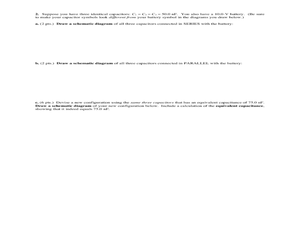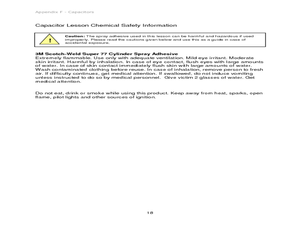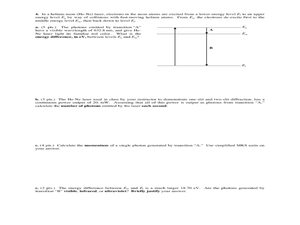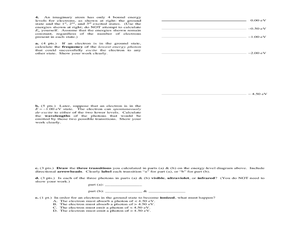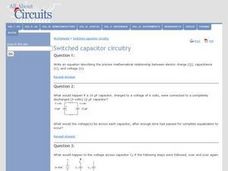Curated OER
Fall 2003 Midterm Exam #1
Electricity is the focus of this college-level midterm exam. It requres physics learners to answer multiple choice and short answer questions in addition to evaluating several diagrams and graphs. This is appropriate for most high school...
Curated OER
Fall 2004 Midterm Exam #2 - Electricity and Magnetism
Written for a college physics course, this midterm examination deals with electric and magnetic fields. When taking this test, learners answer multiple choice questions, solve problems, and analyze a variety of attractive diagrams....
Curated OER
Midterm Exam #1, Electricity Concepts
The physics department at The University of Hawaii has designed midterm exams for their college physics courses. This version deals with electricity concepts. It requires learners to calculate conversions, capacitance, and potential...
Curated OER
Coulomb's Law and Induced Polarization
Engage your aspiring physicists in a series of lab activities directied at demonstrating the behavior of electric force. In completing these exercises, learners will explore Coulomb's and Gauss's Laws. Well-written directions to four...
CK-12 Foundation
Touch Screen
Touch screens are becoming more common, but how do they work? The simulation shows the electric potential versus system charge as scholars alter three variables. The schematic of the capacitance demonstrates the set up as each variable...
PHET
Capacitor Lab
The first capacitor was a Leyden jar, invented in 1745. Physics scholars explore capacitors in an engaging simulation. They may view one or set up circuits which contain two to three either in series or parallel. Other views include...
Urbana School District
Electric Fields
What kind of pears do electricians eat? Amperes! Presentation begins with electric field vectors for various charge configurations and field strengths for both point charges and uniform fields. It continues with various surfaces,...
Curated OER
Energy
Wow! Colorful and simple, these 160 slides introduce the various forms of energy, along with a relevant image. Some of the images are animations, which help beginning physical scientists to visualize the flow of electrons or energy! This...
Curated OER
Capacitors: What Are They?
Students discover how capacitors help store data. In this computer science activity, students investigate how capacitors can store an electronic charge, eventually helping computers store data. Students create their own capacitors with...
Curated OER
What's a Capacitor?
Students explain concepts of charge storage, how a capacitor works and how DRAM uses capacitors to store memory. They construct a capacitor and use a multimeter with capacitance meter capability to measure the stored charge in the...
Curated OER
Fall 2004 Midterm Exam #1, Parts A & B
First year physics learners show what they know about electric potential, circuits, power, current, and voltage on this midterm exam. It consists of a multiple choice section, some true or false questions, and two multi-step problems to...
Curated OER
Physics Final Exam
A two-hour final exam covers a range of physics topics related to electricity and magnetism. It employs a variety of methodologies for assessing your physics learners' understanding and mastery of these concepts. You will need to review...
Curated OER
Physics Final Exam, Part A
Here is a comprehensive and cohesive final exam for your high school physicists. A variety of question styles are incorporated, such as multiple-choice and problem-solving. Topics are too many to list, so you will want to review the exam...
Curated OER
Switched Capacitor Circuitry
In this electronics worksheet, students complete 15 short answers and problem solving questions related to capacitance circuits.
Curated OER
Capacitors
In this physics learning exercise, students identify the parts and function of different types of capacitors. They solve and write short answers to 15 questions.
Curated OER
AC Network Analysis
In this AC networks worksheet, students analyze and answer 24 questions about AC circuits. They calculate impedance values, they determine phase shifts, and they solve complex number arithmetic used to analyze AC circuits.
Curated OER
Time Constant Calculations
In this time constant worksheet, learners answer 52 questions about the rate of current changes and voltage changes in capacitors. They analyze circuits and determine the time it takes for capacitors to change voltage and they specify...
Curated OER
Passive Integrator and Differentiator Circuits
In this circuits worksheet, students answer 25 questions about passive integrator circuits and passive differentiator circuits given schematics showing voltage. Students use calculus to solve the problems.
Curated OER
Capacitance
In this capacitance worksheet, students solve 19 problems about capacitance, voltage, electric charge and Ohm's Law. They use calculus to solve some of the problems and they are given equations used to solve different capacitance problems.
Curated OER
Time Constant Circuits
In this time constant circuits activity, students answer 23 questions about the design of circuits that need time delays, about capacitors and inductors, and about resistors and the design of circuits.
Curated OER
Oscillator Circuits
In this oscillator circuits worksheet, students answer 49 questions about different types of oscillator circuits. They find the operating frequency of circuits, they identify the functions of specific sections of circuits and they write...
Curated OER
Circuits and Symbols
In this circuits worksheet, students read how electricity flows through circuits and learn how to draw a circuit diagram. Students then complete 16 matching, 2 multiple choice, 14 fill in the blank, and 3 short answer questions.
Curated OER
Discovering Circuit Boards
In this circuit board learning exercise, students research the 5 parts of a circuit board: transistors, resistors, capacitors, diodes, and inductors. This learning exercise has 5 short answer questions.
Curated OER
Resistor-Capacitor Circuits
In this physics worksheet, students determine whether the current flows through the resistor after the switch is closed and explain why. Then they determine whether the capacitor will discharge faster or slower if there is an increase in...




